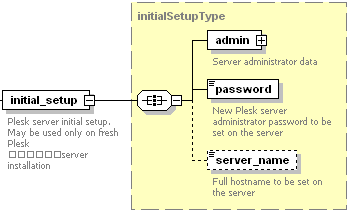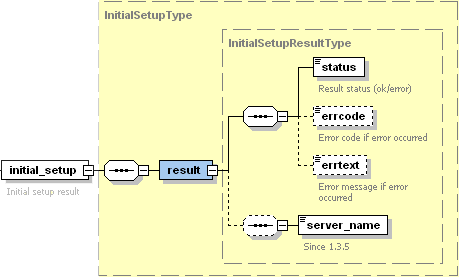Performing Initial Server Setup
Initial server setup is performed right after installing Plesk on a server. This operation includes:
- Specifying Plesk Administrator’s personal information
- Changing default Plesk Administrator’s password
- Specifying full host name
To initially set up Plesk server, use the initial_setup operation.
Note: Using the initial_setup operation later on to change administrator’s password or personal info is prohibited. For this purposes, use the set operation instead.
Request Packet Structure
A request XML packet starting server initial setup contains the initial_setup operation node:
<packet>
<server>
<initial_setup>
...
</initial_setup>
</server>
</packet>
The initial_setup node is presented by complex type
initialSetupType (plesk_server.xsd) and structured as follows:

Note: The interactive schema navigator for all request packets is available here: http://plesk.github.io/api-schemas/1.6.8.0/agent_input.svg.
- The admin node is required. It holds the collection of data
describing Plesk Administrator’s personal info. Data type:
adminType (
plesk_server.xsd). For information on this node structure, refer to the Administrator Personal Information section. - The password node is required. It holds the new Plesk
Administrator’s password that will replace the default one. Data
type: serverPassword (
plesk_server.xsd). Allowed values: 5 to 14 characters. - The server_name node is optional. It specifies the full host name. Data type: string.
- The trial_license node is available starting with Plesk 17.8.10. Used to install a full-featured trial license right from the Plesk post-installation configuration dialog.
Note: By using the trial_license node, you authorize Plesk to collect, store, process, and use your personal data (name and email), including cross-border processing, in accordance with the applicable data protection laws currently in effect, for issuing your trial license as a part of a licensing contract between you and Plesk.
Note: When creating request packets, put nodes and elements in the order they follow in the packet structure.
Response Packet Structure
The initial_setup node of the response packet is structured as follows:

- The result node is required. It wraps the result of the
initial_setup operation. Data type: InitialSetupResultType
(
server_output.xsd). - The status node is required. It returns the execution status of
the initial_setup operation. Data type: string
(
common.xsd). Allowed values: ok | error. - The errcode node is optional. It returns the error code when the initial_setup operation fails. Data type: unsignedInt (integer) .
- The errtext node is optional. It returns the error message if the initial_setup operation fails. Data type: string.
- The server_name node is required if the initial_setup operation succeeds. It returns the name of the server on which initial setup was successfully performed. Data type: string.
Note: The interactive schema navigator for all response packets is available here: http://plesk.github.io/api-schemas/1.6.8.0/agent_output.svg.
Samples
A request packet performing initial setup of Plesk server can look as follows:
<packet version="1.6.7.0">
<server>
<initial_setup>
<admin>
<admin_cname>JohnDoe BV.</admin_cname>
<admin_pname>John Doe</admin_pname>
<admin_phone>+49 89333333</admin_phone>
<admin_fax>+49 893333303</admin_fax>
<admin_email>john@doe.de</admin_email>
<admin_address>Theatinerstrasse 96</admin_address>
<admin_city>Muenchen</admin_city>
<admin_state>Bavaria</admin_state>
<admin_pcode>80333</admin_pcode>
<admin_country>DE</admin_country>
<send_announce>true</send_announce>
</admin>
<password>setup</password>
<server_name>com3.doe.de</server_name>
</initial_setup>
</server>
</packet>
Response:
<packet version="1.6.7.0">
<server>
<initial_setup>
<result>
<status>ok</status>
<server_name>com3.doe.de</server_name>
</result>
</initial_setup>
</server>
</packet>
A negative response received from server may look as follows:
<packet version="1.6.7.0">
<server>
<initial_setup>
<result>
<status>error</status>
<errcode>1003</errcode>
<errtext>Initial setup already completed</errtext>
<server_name>com3.doe.de</server_name>
</result>
</initial_setup>
</server>
</packet>
Such error is received if the request packet sent to the server tried to perform initial setup on a server where it has already been done.
A request packet performing initial setup of Plesk 17.8.10 with a full-featured trial license can look as follows:
<packet version="1.6.9.1">
<server>
<initial_setup>
<admin>
<admin_pname>john_doe</admin_pname>
<admin_email>johndoe@mail.com</admin_email>
</admin>
<password>setup</password>
<trial_license>true</trial_license>
</initial_setup>
</server>
</packet>
Response:
<?xml version="1.0" encoding="UTF-8"?>
<packet version="1.6.9.1">
<server>
<initial_setup>
<result>
<status>ok</status>
</result>
</initial_setup>
</server>
</packet>